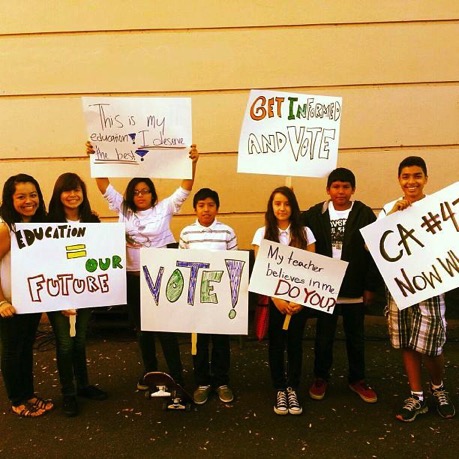Whenever people ask me what I miss most about my classroom days, I often struggle between two specific memories: my days as an National Council of La Raza Service Learning teacher and the many hours spent discussing educational equity. Even though my students were all 6th-8th graders, their opinions and thoughts were always filled with passion and experience, as they used their personal narratives to develop their own conclusions about the world around them.
As a first year teacher, I was provided the opportunity to receive professional development from the National Council of La Raza (NCLR) through their signature “CASA” program (Cultura, Aprendizaje, Servicio, Acción), a service-learning project that is geared towards middle school students. “CASA‘s goal is to foster academic learning within a context that speaks to students’ cultural and linguistic background. Participants acquire the necessary skills to address a genuine need in the Latino community through volunteer activities and other learning experiences.” As part of NCLR’s cohort of educators, I was exposed to the many opportunities that we as educators have in everyday instruction to promote student voices and create opportunities to embrace their knowledge and experiences as a way of mobilizing them for civic action.
During that first year with NCLR, my colleagues and I developed curriculum that focused on educational equity and helped students create youth-led campaigns to fundraise towards equipment, resources and opportunities that they felt were important to their own educational journey. Witnessing 7th graders take complete ownership over their education is one of the most powerful moments of my life. What was even more amazing, however, was realizing how eager my students were to make a difference and have their voices be heard. Without realizing it, this service-learning project helped inspire some of my students to become involved advocates of change — a few of them even volunteered for my own campaign as they felt their voices were important and that the community should hear from them too.
As the presidential election approaches, I can’t help but miss my classroom days. I can only imagine all the conversations we could be having around the different issues from education to criminal justice reform and the ideas and solutions they would be identifying to solve the overly complicated systems that we adults have created. There is so much our students can offer, and yet there are not enough opportunities for them to truly voice them.
Today, I urge you to engage young students who you know and work with. Ask them thought-provoking questions. They will probably have more to share than you would ever imagine. If you are an educator, allow a space in your class for discussion. If you need a starting point, start here. Newsela is a great resource that recreates articles to be student-friendly, based on recent events.
The earlier we engage our students into being active community members, the greater the difference they will make in the future. During every campaign cycle, we talk about mobilizing our youth yet we forget some of our most promising, community leaders and advocates are still inside classrooms, learning the systems and experiencing first hand how the system is not always on their side. Let’s all do our part and engage them now.
Perhaps through authentic listening, we can find the solutions from students — the same ones often missing at the table where adults make decisions about their education.
And just remember to prepared; you will be taken back by how much young people have to offer and how real all these issues are to them.
Alma Renteria
Latest posts by Alma Renteria (see all)
- Rincón Universitario: Cómo Escribir una Narrativa Auténtica para Solicitudes de Universidades, Parte 3 - October 17, 2019
- College Corner: How To Write An Authentic Narrative for College Applications, Part 3 - October 15, 2019
- Rincón Universitario: Cómo Escribir Una Narrativa Auténtica para Solicitudes Universitarias, Parte 2 - October 1, 2019
- College Corner: How To Write An Authentic Narrative for College Applications, Part 2 - September 26, 2019
- College Corner: Cómo Escribir un Relato Auténtico de Solicitudes para la Universidad, Parte 1 - September 4, 2019

